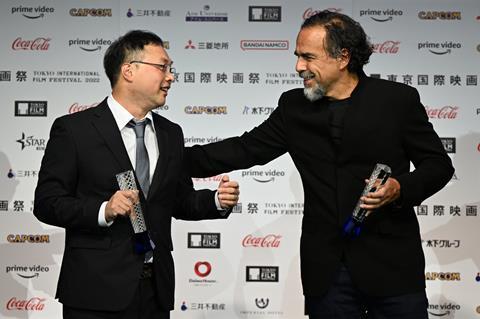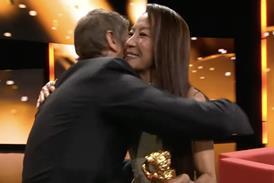
Filmmakers Koji Fukada and Alejandro Gonzalez Inarritu each received an honorary Kurosawa Akira Award at Tokyo International Film Festival on Saturday (October 29) and donated proceeds to supporting talent.
Japan’s Fukada is known for directing features such as Venice competition title Love Life, Cannes 2016 Un Certain Regard jury prize winner Harmonium, and Locarno 2019 competition title A Girl Missing. But he is also a well-known activist who campaigns on behalf of independent filmmakers in Japan and used his TIFF platform to draw attention to ongoing struggles in the industry.
“I grew up watching films by masters like Kurosawa, Ozu, Mizoguchi and Naruse, then I entered film school,” he said, accepting the honorary award at a black-tie event at Tokyo’s Imperial Hotel. “There was a golden era of cinema in Japan, and during that time, the directors and crew were hired by the studios and their livelihood was guaranteed.
“When I started working in 2000, the studio system had collapsed, and industry stability had been lost. Everyone was working as a freelancer. After 2000, budgets started going down and we all had to live in a time of great instability. Then in 2020, the pandemic hit us all, including members of the film industry. The cinemas, too, were faced with the decision of closing down, due to the situation. Many actors have been lost to suicide, many are out of work and we need to think about ways to protect those working in the industry.
“There’s also the pressing issue of harassment, mental health and other serious situations in the film industry that we now recognise thanks to whistleblowers. We could not wait for a legal safety net, so we began our own organisation called Arts Workers Japan, which is funded by donations and in danger of closing down. Since I received the award primarily for my activism, I would like to donate my award money for this vital service to continue.”
Arts Workers Japan was launched last year as a nationwide network to support people working in culture and the arts. Fukada, who also highlighted the “difficult environment for young directors” in Japan during an on-stage conversation at TIFF, will donate the ¥1m (£5,800) that comes with the Kurosawa Award to the organisation.
Inarritu donates to scholarship
Mexican filmmaker Inarritu will also donate his award money to the ReconoceR scholarship, which he co-founded with the University of Monterrey to cover tuition and housing expenses for young Mexican and Central American immigrants living in the US.
The Oscar-winning director of The Revenant, Birdman and Babel recalled how finances from TIFF helped advance his career. “My relationship with Tokyo started 22 years ago, when I came to TIFF with Amores Perros,” said Inarritu. “I won two awards and received $100,000 in award money, which changed everything for me.
“Seven years later, I came to shoot a section of the film Babel and lived here for five months. It was one of the most incredible experiences I’ve ever had as a filmmaker, and one of the happiest experiences of my life. Then I was invited to be president of the jury in 2009.
“My relationship with Japanese culture has been very deep, from music to literature to film. To receive this award in the name of the master of masters, the god of the temple of cinema, who has had a profound influence on every other filmmaker, is such an honour.”
The honorary prizes marked the first time the Kurosawa Akira Award had been given in 14 years. The award is presented to filmmakers who are making extraordinary contributions to world cinema and are expected to help define the film industry’s future. Past recipients include Steven Spielberg, Yamada Yoji and Hou Hsiao Hsien.
Inarritu had arrived from New York the night before and screened his latest feature, Bardo, False Chronicle Of A Handful Of Truths, in TIFF’s gala selection.
The three Kurosawa films he named in terms of importance to him were Rashomon, Ran and Seven Samurai while Fukada said his favourite Kurosawa feature was 1970’s Dodes’ka-den.
























No comments yet